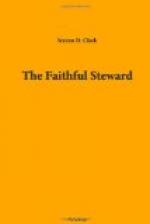4th. The Scriptures favor the idea of frequency in giving. Christ says, “Give to him that asketh of thee.” The duty of charity is here clearly founded on our calls and ability. But in this world, where we have the poor always with us, calls on our benevolence cannot be otherwise than frequent. Again Christ says, “Freely ye have received, freely give.” We frequently receive, we should therefore frequently give. Paul directs the Corinthian Christians, “Upon the first day of the week, let every one of you lay by him in store as God has prospered him.” This suggestion of the Apostle may probably be adopted a general rule by a majority of Christians at the present day; and every one should make it a matter of solemn consideration and earnest prayer whether it is not his individual duty; for all must conform to it in spirit. But without maintaining that every one, under whatever circumstances, is required to lay by something weekly for charitable purposes, the principle here taught us most unequivocally binds us to great frequency of stated contributions. From this decision of the Holy Spirit, according, as it does, with the teachings of reason, there can be no appeal.
5th. The experience of practical men, as to the best means of acquiring property, evinces the same principle. The experience of the world on this point has been embodied in maxims such as these: “Take care of your cents, and dollars will take care of themselves;” “Save your ninepences,” &c. Men of wealth have often remarked that they acquired their property by frequently storing away small sums as they could spare them. I knew a man lay up several dollars by making it a rule to put into a bag kept for the purpose, every




